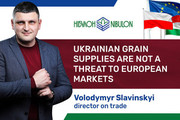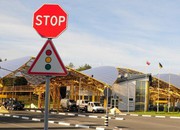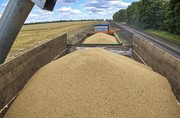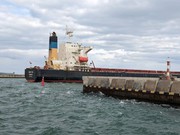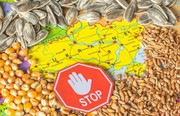News
Ukrainian grain supplies are not a threat to European markets - NIBULON
The most discussed news from the agricultural sector in recent days is the restriction which is introduced for the supply of grain, oil crops, and processed products by some of our neighbors - EU member states. We consider it appropriate to comment on the situation and highlight certain points.
- Read more
- 606 reads
Hungary Grain Lobby Urges Cabinet to Scrap Ukraine Import Ban
Hungary’s grain lobby criticized a government ban on agricultural imports from Ukraine, saying it would lead to shortages and undermine efforts to curb the European Union’s highest inflation rate.
- Read more
- 560 reads
UDEU demands the government of Ukraine to introduce a ban on the import of dairy products from Poland
Two-day negotiations between representatives of the Ukrainian government and Polish colleagues regarding the ban on the import of Ukrainian agricultural and food products into Poland, as well as their transit, introduced for the period from April 15 to June 30, ended in Warsaw. The result of the negotiations was an agreement on the resumption of transit through the territory of Poland from April 21.
The Union of the Dairy Enterprises of Ukraine is disappointed with the outcome of the negotiations. It does not change the situation with the ban on milk exports and thus puts the domestic dairy industry under attack.
- Read more
- 1351 reads
Ukrainian agrarians call on their European colleagues to remove strict unilateral trade restrictions and jointly find a compromise solution
This is stated in the joint appeal of the leading public associations of the agri-food sector of Ukraine. The agricultural community is extremely concerned about the situation with the unilateral ban on the import of Ukrainian food to certain EU countries.
We are talking about the decision of the Governments of Poland, Hungary, Slovakia and Bulgaria to ban the import of agricultural products from Ukraine. These decisions also provoke certain similar actions of other EU countries that are neighbours of Ukraine. In particular, there are currently ongoing discussions in Romania.
- Read more
- 1387 reads
Oleksandr Kubrakov met with Minister of National Defence of Turkey Hulusi Akar
Oleksandr Kubrakov, Deputy Prime Minister for Recovery, Minister for Communities, Territories and Infrastructure Development, met with Hulusi Akar, Minister of National Defence of Turkey.
Oleksandr Kubrakov commented: "We have completed a meeting with Hulusi Akar, Minister of National Defence of Turkey. The main issue on the agenda is unblocking and ensuring the effective functioning of the Black Sea Grain Initiative. We agreed to resume registration and inspection of ships arriving to load Ukrainian grain.
- Read more
- 721 reads
Ukraine and Poland agreed to resume the transit of agricultural products
Ukraine and Poland have reached the agreement to resume the transit of Ukrainian agricultural products. It will start operating on the night of April 20-21, 2023.
- Read more
- 1091 reads
The ban on the import of Ukrainian agricultural products may affect the sowing campaign, - Pavlo Koval
The UN-backed grain corridor is the main exit route for Ukrainian agricultural exports, so the decision by Poland, Hungary, Slovakia and Bulgaria to block them too will cause considerable damage to Ukrainian farmers and a sector hard hit by the war.
Kyiv's hope is that a negotiated solution will be found on a multilateral scale between Ukraine, the national governments involved and the European Commission (EC), whose decision to lift tariffs on its products triggered a reaction from the four eastern countries.
- Read more
- 876 reads
Ministry of Agrarian Policy and Food: Ship with 30,000 tonnes of Ukrainian wheat arrives in Yemen under Grain from Ukraine
As part of the Grain from Ukraine initiative of President of Ukraine Volodymyr Zelenskyy, the ship Negmar Cicek delivered humanitarian cargo – 30,000 tons of wheat – to the Port of Salif in the Republic of Yemen.
- Read more
- 597 reads
Grain initiative under threat of shutdown: Russia again blocked ship inspections in the Bosphorus
As expected, Russia took advantage of the situation when three European countries banned the import of Ukrainian products, and Poland, moreover, banned transit.
As a result of these actions, the export of Ukrainian agricultural products is again very limited.
- Read more
- 1026 reads
European Commission criticizes decision of Poland and Hungary to ban Ukraine grain imports
Unilateral action on trade by European Union member states is unacceptable, the bloc's executive said on Sunday, after Poland and Hungary announced bans on grain and other food imports from Ukraine to protect their local agricultural sectors.
- Read more
- 1060 reads
